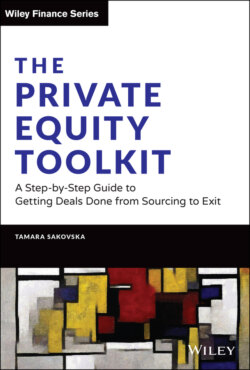Читать книгу The Private Equity Toolkit - Tamara Sakovska - Страница 40
Developing an Edge in Opportunistic Deal Sourcing
ОглавлениеDo you know what sourcing strategy is used by private equity professionals most often? I believe an overwhelming majority of all private equity transactions executed each year around the world are opportunistic. No matter what geography you look into, you are likely to observe a similar theme: private equity funds are expected to network with intermediaries, analyze pitchbooks and investment memoranda, attend company meetings and write numerous offer letters—all in hopes of executing a good deal. Some funds might develop a “deal angle,” and some funds might not even do that—private equity professionals are under immense pressure to stay open-minded in an opportunistic environment.
Many funds choose to maximize their options by increasing the total number of investment opportunities they review every year. There is nothing wrong with this approach, provided you have enough time and bandwidth. Think about what takes up your resources: an average deal professional with a couple of years of private equity experience might amass over 1,000 industry-related connections. A good investment banker active in private equity transactions for at least a decade will probably have enough contacts to fill a large cruise ship. The people you meet professionally often seek to be in touch, send investment ideas, request meetings and, through various means, gently bombard you with vast amounts of information, only a small proportion of which might be relevant to your fund. Generally speaking, everyone in the private equity industry is reasonably well-connected, keen to get deals done and competing in a market with diminishing knowledge barriers. This makes the job of a private equity investor very difficult because the market is definitely overcrowded and information is overabundant.
How can you possibly gain an edge over your competition in this environment? How can you make sure that your opportunistic deal search is not just busy work, but a productive process with a good chance of uncovering a gem of an investment? Having spent considerable time thinking about it, I have settled on the two key factors that matter most. First, staying top of mind with your most relevant contacts, and second, getting the most out of your time by reviewing only relevant deals.
If you experience severe time constraints and are not able to dedicate resources at present to developing a systematic approach for finding opportunistic deals, you will vastly improve the quality of your opportunistic deal search by focusing on just these two areas. Spending time on relevant deals with relevant people should function as a powerful antidote to the intrinsic randomness of opportunistic transactions. Focus on these two things and see what happens. My guess is that you will cut through the noise in order to isolate only those deals that represent the best fit with your investment mandate.
And yet it is hard to see what can surpass a systematic deal sourcing approach if you are looking to build value for your franchise in the long term. Once you set the objective of generating a sustainable flow of high-quality opportunistic ideas, you have to invest some initial time and resources in order to lay a solid foundation.
